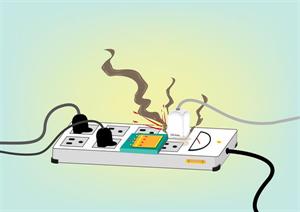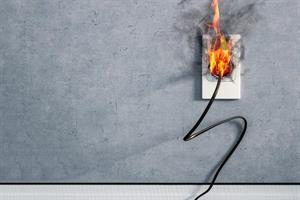PDF chapter test TRY NOW
When many electrical devices are connected in series to a single socket, there will be an overflow of current, causing the electrical circuit to overload. When the current running through a wire exceeds the maximum limit, the wires become overheated and causes fire. It is then referred to as overloading.

Overloading circuits
Short-circuiting:
A short-circuit occurs when a live wire makes contact with a neutral wire.

Short-circuiting of a plug
A short-circuit reduces the circuit's effective resistance, thus allowing a large amount of current to pass through the wires.
These short-circuits and overloads are very dangerous and can cause fire accidents in the buildings. The fuse wire or MCB will automatically disconnect the circuit during an overload or short-circuit to prevent accidents.
Earthing:
In most household circuits, a third wire, known as the earth wire, is attached to the body of the metallic electric device. The earth wire has green insulation, and its opposite end is attached to a metal tube or an electrode buried in the ground. This wire gives a low-resistance channel to the electric current.
Earth wire
When a live wire accidentally contacts the body of a metallic electric appliance, the earth wire directly transmits the current from the appliance's body to the Earth. As a result, the earth wire acts as a protective conductor, preventing us from electric shocks.
Reference:
https://upload.wikimedia.org/wikipedia/commons/8/83/PEN_earthing.JPG
